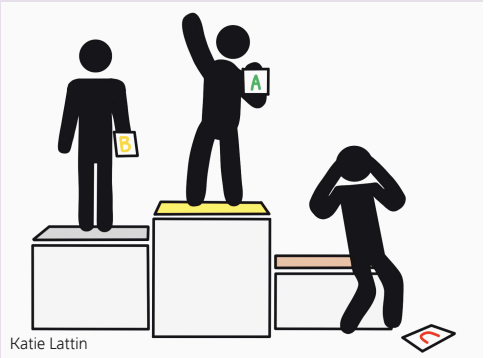Academic competition has long been a strong aspect of Blake’s environment, partially because of the reputation for academic excellence that has become a pillar of the community’s identity. Although there is academic competition at countless other schools, because we fall under the college-prep category, it is arguably ingrained in our school culture. Because it is such a norm, many students are oblivious to their own competitiveness. As students grow older, leaving middle school and beginning their preparations for college, this competitiveness only increases. Although there are few positive impacts of the academic competition, which can include increased levels of motivation and rising effort levels, holistically, it only harms students and creates a toxic environment.
Throughout my years at the high school, I have witnessed and experienced countless moments of tension and rivalry between students who strive to be the best. Academic competition creates a very toxic environment, leading students to feeling stressed and overwhelmed by self imposed pressures. Students often feel the need to prove their academic abilities and compete with others, often asking others about their grades on tests and emphasizing their own. Some students may even be proving their skills because they feel insecure of not being good enough. Tess Dayhoff ‘25 has experienced many years of competition and says, “Obviously some competition is healthy and it’s good, but Blake is such a rigorous environment that I feel like it has a little bit too much; where you are just so focused on being better than everyone else that you become unhappy”.
Oftentimes there is not only pressure from self and peers, but some parents also place large amounts of pressure on their kids. Many students constantly base their self worth and esteem on what their grades are. Blake’s high level of academic competition leads students to fight to be the top of the class, not only striving for an A or a B, but the highest possible grade they can get. Especially during my time in high school, I have listened to countless students complain about getting only a few points off on large tests, even though they still have an A. The energy that fills the room can become very toxic as many students are unsatisfied with their grades. Dayhoff described, “You don’t wanna be falling behind. You don’t wanna be the one that’s doing the worst. So if you hear your friends are doing very well, you also wanna make sure you’re up to their level, and you wanna be doing just as well, if not better”.
When students talking about what future classes everyone has signed up for, there is often some tension about who is taking more honors or AP classes. Even though teachers don’t encourage students to take higher level classes, many people feel the need to take harder or accelerated classes in hopes of getting into top colleges. The problem with this pressure is that each student has different strengths and weaknesses, making certain classes harder while others simpler. It is difficult to hold a standard for oneself of what advanced classes a student should take because their peers around them are at different levels.
In order to combat academic competition, students must attempt to collaborate with their peers rather than competing. Other ways to avoid the toxic competition is to only focus on yourself, one can be supportive of the students around them, but they don’t need to compare themselves to anybody else. With reduced levels of academic competition, our environment could become more beneficial to all students. Although taking rigorous classes and being serious in school is important, it is necessary to still have fun and register for the classes that you have genuine interest in.






